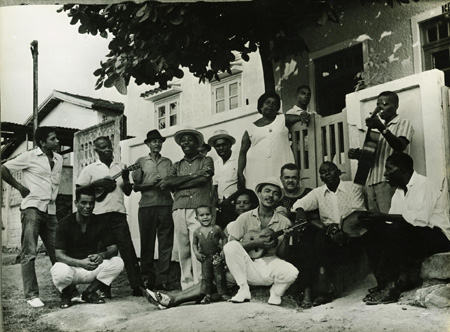Portela, eu às vezes meditando // Portela, sometimes as I reflect
Quase acabo até chorando // I end up almost crying
E nem posso me lembrar // And I can’t even think about it
Teus livros têm tantas páginas belas // Your books have so many beautiful pages
Se for falar da Portela, hoje não vou terminar // If I start to talk about Portela, I won’t finish today
A Mangueira de Cartola, velhos tempos de apogeu // Mangueira of Cartola, old days of glory
O Estácio de Ismael, dizendo que o samba era seu // Estácio of Ismael, declaring samba was his
Em Oswaldo Cruz, bem perto de Madureira // In Oswaldo Cruz, right near Madureira
Todos só falavam Paulo Benjamin de Oliveira // Everyone just talked about Paulo Benjamin de Oliveira
Paulo e Claudionor quando chegavam // Paulo and Claudionor when they got to
Na roda do samba abafavam // the roda de samba, they tore it up
Todos corriam pra ver // Everyone ran to see
Pra ver, se não me falha a memória // To see if my memory doesn’t fail me
No livro da nossa história tem conquistas a valer // In our history book there are true, meaningful victories
Juro que nem posso me lembrar // I swear I can’t even think about it
Se for falar da Portela, hoje não vou terminar // If I start to talk about Portela, I won’t finish today
Quase acabo até chorando // I end up almost crying
E nem posso me lembrar // And I can’t even think about it
Teus livros têm tantas páginas belas // Your books have so many beautiful pages
Se for falar da Portela, hoje não vou terminar // If I start to talk about Portela, I won’t finish today
A Mangueira de Cartola, velhos tempos de apogeu // Mangueira of Cartola, old days of glory
O Estácio de Ismael, dizendo que o samba era seu // Estácio of Ismael, declaring samba was his
Em Oswaldo Cruz, bem perto de Madureira // In Oswaldo Cruz, right near Madureira
Todos só falavam Paulo Benjamin de Oliveira // Everyone just talked about Paulo Benjamin de Oliveira
Paulo e Claudionor quando chegavam // Paulo and Claudionor when they got to
Na roda do samba abafavam // the roda de samba, they tore it up
Todos corriam pra ver // Everyone ran to see
Pra ver, se não me falha a memória // To see if my memory doesn’t fail me
No livro da nossa história tem conquistas a valer // In our history book there are true, meaningful victories
Juro que nem posso me lembrar // I swear I can’t even think about it
Se for falar da Portela, hoje não vou terminar // If I start to talk about Portela, I won’t finish today

Portela’s Velha Guarda in 1970, with Paulinho da Viola standing on far left and Monarco at center with a cavaquinho.
As I mentioned in this post
on Paulo da Portela, the history of the founding of Portela Samba
School in the 1920s is murky and unlikely to be cleared up. Historians
and old-time members of the school don’t even agree on the year, much
less the day, that the school was founded. But the school has adopted
April 11, 1923, as its official founding date, and today is celebrating
92 years.
This song by Monarco — who arrived at the school as a composer in 1946 at the tender age of 14 — evokes the portelense tradition
of adopting a scholar-ish tone in sambas, referring to books,
professors and “tests,” like in Paulo da Portela’s samba for Carnaval
1939, “Teste ao Samba.” The song refers to Ismael Silva’s affirmation that he and his crew at Estácio Samba School, at the time called Deixa Falar, had
come up with the name “samba school” along with the samba rhythm that
was adopted by all of Rio’s samba schools — which Silva famously defined
as “bum-bum-paticumbum-prugurundum.” Silva’s story about the name
“samba school” is widely refuted, but not the rhythmical innovations
of Estácio. (“Bum-bum-paticumbum-prugurundum”also became the name of
Império Serrano’s fantastic 1982 samba-enredo.)
Claudionor, together with Paulo, Caetano, and Rufino (again, see this post), was one of the founding members of Portela, having formed part of the predecessor bloco “Baianinhas de Oswaldo Cruz.”
In 1970, Paulinho da Viola brought together Portela’s oldest members – the “velha guarda,” or old guard — to record the LP Portela Passado de Glória. The
album, which Paulinho produced, recorded many old, yet unreleased
sambas by some of the school’s founders and earliest composers, and
officially launched the Velha Guarda da Portela as a group in itself. The album includes the first recording of “Passado de Glória.”

